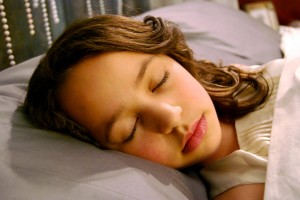Think back to a time when you were obviously short on sleep yet still had to face a busy day. Maybe you spent a good portion of the night up with a sick child but still had to be at work early the next day, or perhaps you tossed and turned thinking about an upcoming assignment and barely slept a wink the night before you were due at your friends house to help them move the furniture. Try to remember what you were feeling at the time and how your reactions may have differed from those of a person who was experiencing the same chain of events after a restful night of sleep. Sleep deprivation can impact all areas of a person’s life and is thought to be one of the main contributors to anxiety. It is no wonder than that a restful nights sleep can make a notable difference when it comes to a child with anxiety.
According to the National Sleep Foundation, there is no magic number for the amount of sleep that a person needs because everyone’s sleep needs are a bit different. However, the National Sleep Foundation uses the following information as a guideline when determining how the amount of sleep needed in any 24 hour period:
Under 3 months old: 12-18 hours
3-11 months old: 14-15 hours
1-3 years old: 12-14 hours
3-5 years old: 11-13 hours
5-10 years old: 10-11 hours
10-17 years old: 8.5-9.25 hours
Adults: 7-9 hours
There are various reasons why a child may not be getting enough sleep. Some reasons are physical (such as sleep apnea), while others are psychological (such as sleep anxiety or insomnia). Other reasons include an overbooked schedule, or a child’s circadian rhythms not aligning with their daily schedule (such as a teenager whose body is not ready for bed until 10pm yet needs to be up for school at 6:30am) .
Studies suggest that the association between sleep and anxiety may be largely due to the insufficient amount of REM sleep that sleep deprived individuals are experiencing. During REM sleep (the stage of sleep in which dreaming occurs), the brain processes emotions, and sorts through stressful events. Most individuals go through three to four cycles of REM sleep a night. When it comes to children and adolescents, the American Academy of Anxiety considers lack of sleep to be a major cause of psychological and physical impairments. Physical symptoms may include: headaches, hyperactivity, dizziness, sore muscles, and impaired coordination. Even if sleep deprivation is not the cause of a child’s anxiety, a sleep shortage is likely to heighten anxiety symptoms such as irritability, impatience, poor impulse control, increased frustration, and difficulty regulating emotions.






